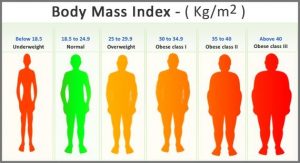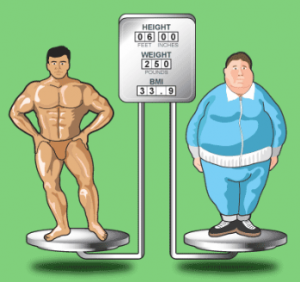You may have heard many physicians, nurses or other health workers often calculating and referring to the term Body Mass Index. So what is it really? Simply put, it is an index that is calculated using your weight and height which is used to estimate your body fat content. Worldwide, the incidence of obesity has nearly tripled today since 1975. However, BMI can be used an easy tool to make sure that you are staying in shape and consuming the right amount of calories for your body.
How to calculate Body Mass Index?
Body mass index is calculated as your weight (in kgs) divided by the square of your height in meters (m2). Thus, the value of BMI is calculated in kg/m2.

BMI= Weight(Kg)/Height2(m2)
So for example, if your weight is 45 kgs and your height is 1.32 meters, your BMI will be 45/(1.32)2= 25.86 kg/m2.
BMI can also be measured in terms of pounds per inch2.
What is the ideal Body Mass Index for you?
Every individual in the world is different, however, according to the World Health Organization, ideally, your BMI should be between 18.5 and 24.9 kg/m2. In clinical terms, a BMI between 25 and 29.9 kg/m2 is called overweight, and a BMI above 30 kg/m2 referred to as obese.
WHO classification of BMI

- <18.5 : underweight
- 18.5-24.9 : normal
- 25-29.9 : overweight
- 30.0-34.9 : class I obesity
- 35.0-39.9 : class II obesity
- >=40: class III obesity
Why should you maintain an ideal Body Mass Index?
When your energy intake (in the form of food) is greater than your energy consumption, most of your excess energy is stored in the form of fat. For each 9.3 Calories of excess energy entering the body, about 1 gram of fat is stored. The fat storage mainly occurs in your subcutaneous tissues and intraperitoneal cavity. However, as your BMI approaches obesity, lipids may begin to accumulate in various other organs of the body. This will keep you at a greater risk of developing possibly fatal diseases such as cardiovascular diseases, stroke, diabetes mellitus, hypertension, osteoarthritis, asthma, cholelithiasis (gall stones) and even some cancers. However, the good news is that all these risks can be alleviated by simply maintaining your BMI. You can do it!

There are also several other physical and psychological benefits of maintaining your BMI. Not only will your body look fit and attractive, you will also have higher energy levels. Your muscle and joint pain can be reduced and you will have less risk of osteoporosis as well. Due to the reduced load, your circulatory system will get a chance to work better. Symptoms of depression and anxiety may also be reduced.
Steps to take to maintain your BMI
You can take the following steps in order to maintain an ideal body mass intake

- Consume more fruits and vegetables, try to avoid fast foods
- Exercise and maintain physical activity. The WHO recommends at least 30 minutes of brisk walking per day.
- Reduce alcohol consumption
- Make sure you are getting adequate amounts of sleep
- Intake adequate amount of calories to maintain your ideal weight and BMI
Some things to remember

Although BMI is a commonly used index worldwide, it does can vary due to a wide range of factors such as age, sex, body type, bone density, muscle-fat ratio and overall health. Since it is not a direct estimate of adiposity, it does not take into account the fact that certain individuals have a higher muscle mass. For example, if you are an athlete with a high muscle mass, you may have a high BMI. However, that does not mean that you are not healthy. Therefore, you must remember that it is not an ideal measurement to be used in cases of athletes and pregnant women.



